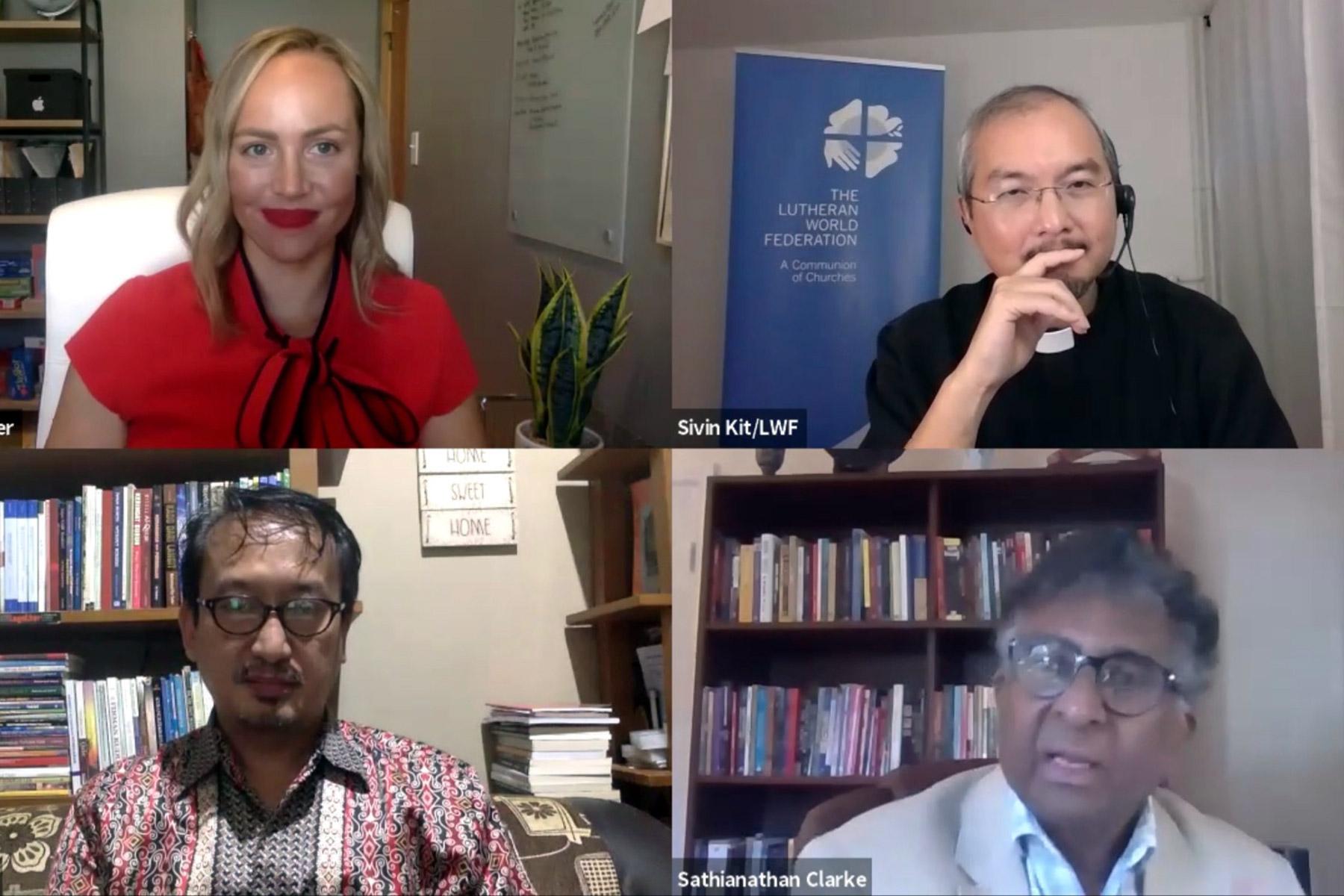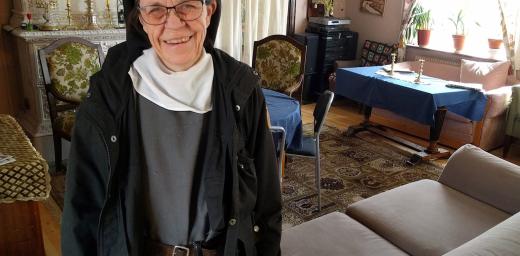Resisting and engaging with religious nationalism

Panelists discussing global responses to religious nationalism: clockwise from top left, ELCA pastor Rev. Angela Denker, LWF moderator Rev. Dr Sivin Kit, Dr Sathianathan Clarke of Wesley Theological Seminary and Dr Dicky Sofjan of the ICRS. Photo: Screenshot from the webinar
An LWF webinar explores ways in which people of faith can respond to the increased politicization of religion
(LWI) - How can people of faith respond to a rise in religious nationalism? How should we react when politicians exploit religious symbols to promote their own exclusivist values and vision? How can interreligious activity support secular groups to uphold a more just, inclusive and caring society?
These dilemmas were focus of a Lutheran World Federation (LWF) webinar on 22 September entitled ‘Ignore, Resist or Engage? Global responses to religious nationalism’. The online discussion, featuring panelists from India, Indonesia and the United States, was jointly organized by the LWF, the Evangelical Lutheran Church in America (ELCA) and the Indonesian Consortium for Religious Studies (ICRS).
Interreligious engagement in the public square
Professor of World Christianity at Wesley Theological Seminary in Washington D.C., Dr Sathianathan Clarke, spoke of the disturbing “capture of the nation state by violent fundamentalist religions” that target those perceived as “a threat to the religious, racial and sexual ideal of the powerful majority.” This is because Christian, Hindu, Jewish, Buddhist and Muslim extremists, he said, “need legitimate public platforms to translate hallowed beliefs into mundane practices” and “shape everyday living in the real world.”
Speaking of the situation in his native India, he noted how Hindu nationalist forces are “striving to destroy the secular nature of the constitution” that protects all religions and ethnicities. In this context, he continued, traditional interreligious practices of praying together “in the safety of our sacred spaces” are insufficient to combat such rise in fundamentalism. People of faith, he insisted, must break out of their “comfortable religious bubbles” and work for greater “interreligious engagement in the public square.”
Muslim political scientist, researcher and faculty member of the ICRS, Dr Dicky Sofjan, offered a differing view from his Indonesian perspective, where, he said, nationalism is not considered to be such an extreme position as it is in Western societies. While many countries are concerned about the re-emergence of religion from the private sphere into the pubic square, he continued, the real threat in Indonesia is from transnational religious movements that are importing and imposing foreign, fundamentalist ideologies.
Sofjan noted that Indonesia’s five founding principles, known as Pancasila, aspire towards “a religious nationalism that is open, tolerant and fully acknowledges the cultural pluralisms and multireligious nature of our nation.” Nationalism is considered “a middle ground” in the search for harmony among hundreds of different ethnic groups and linguistic groups, he said, and Islam has always promoted a “doctrine of unity of religion and politics.”
Secular as the new sacred
Speaking of the situation in the USA, Lutheran pastor and journalist Rev. Angela Denker explained how “Christian nationalism has politicized and distorted the Gospel” to promote a narrative of “America as the new Promised Land.” The author of ‘Red State Christians: Understanding the Voters who elected Donald Trump’, Denker spoke about the influential role of social media in spreading misleading messages and conspiracy theories at a time when mistrust of institutions, including the traditional Christian churches, has reached new heights.
Moderating the online discussion, Rev. Dr Sivin Kit, LWF’s Program Executive for Public Theology and Interreligious Relations, asked what interfaith practitioners can do to help shape peace together in this climate of increased polarization. Dr Clarke insisted on the importance of leaving “the safety of our own languages and places” to envision “the secular as the new sacred, the street as the new temple” where believers “can protect, nurture, preserve” the flourishing of human life.
Dr Sofjan shared the work that the ICRS is doing through its religious literacy program to educate Indonesians who know little or nothing about religion outside of their own faith tradition. Noting that the public-school system needs reforming to include education around different religious communities, he said it is important to reaffirm the notion of “multiple and shifting ethnic and religious identities.”
Our responses as faith leaders must reflect the best of our theological, spiritual and ancestral traditions and, at the same time, must reflect a shared vision and ethic for an inclusive, multi-religious, multi-ethnic, multi-national world, grounded in human rights and justice for all of creation.
Rev. Denker underlined the importance of families and local parish communities as places where stereotypes can be broken down and the politicization of religion can be unmasked. “We need to reclaim the Jesus of the Bible,” she said, and to reaffirm the Gospel values of “charity, repentance, humility, forgiveness” that have been thrown aside in the struggle for “political power and might and wealth and influence.”
In her closing remarks, the ELCA’s executive for ecumenical and interreligious relations and theological discernment, Kathryn Lohre, reiterated the urgency of understanding, resisting and engaging with religious nationalism within “the unique complexities of our context.” Our responses as faith leaders, she concluded, “must reflect the best of our theological, spiritual and ancestral traditions and, at the same time, must reflect a shared vision and ethic for an inclusive, multi-religious, multi-ethnic multi-national world, grounded in human rights and justice for all of creation.”



